This article delves into essential hospitality marketing concepts that can significantly elevate business performance. It underscores the necessity of establishing a robust online presence, implementing targeted marketing strategies, and leveraging data analytics—each of which is vital for attracting guests and enhancing overall engagement in a competitive market. By addressing these key areas, hospitality businesses can not only meet but exceed the expectations of their clientele, thereby driving success in an ever-evolving landscape.
The hospitality industry is experiencing a profound transformation, spurred by shifting consumer expectations and technological advancements. As establishments endeavor to distinguish themselves in an increasingly crowded marketplace, mastering essential marketing concepts is vital for achieving success. This article explores ten key strategies designed to elevate a hospitality business's marketing efforts, ranging from optimizing online presence to leveraging data analytics and implementing sustainability practices.
How can businesses not only attract guests but also cultivate loyalty in a fiercely competitive landscape? Delving into these concepts provides valuable insights for those aiming to thrive in the hospitality sector.
To effectively , begin by conducting a comprehensive evaluation of your current online presence to pinpoint areas that need enhancement. By utilizing data analysis, you can gain insights into customer behavior and preferences, which will inform your promotional decisions.
This iterative approach not only promotes continuous improvement but also amplifies your overall marketing effectiveness.
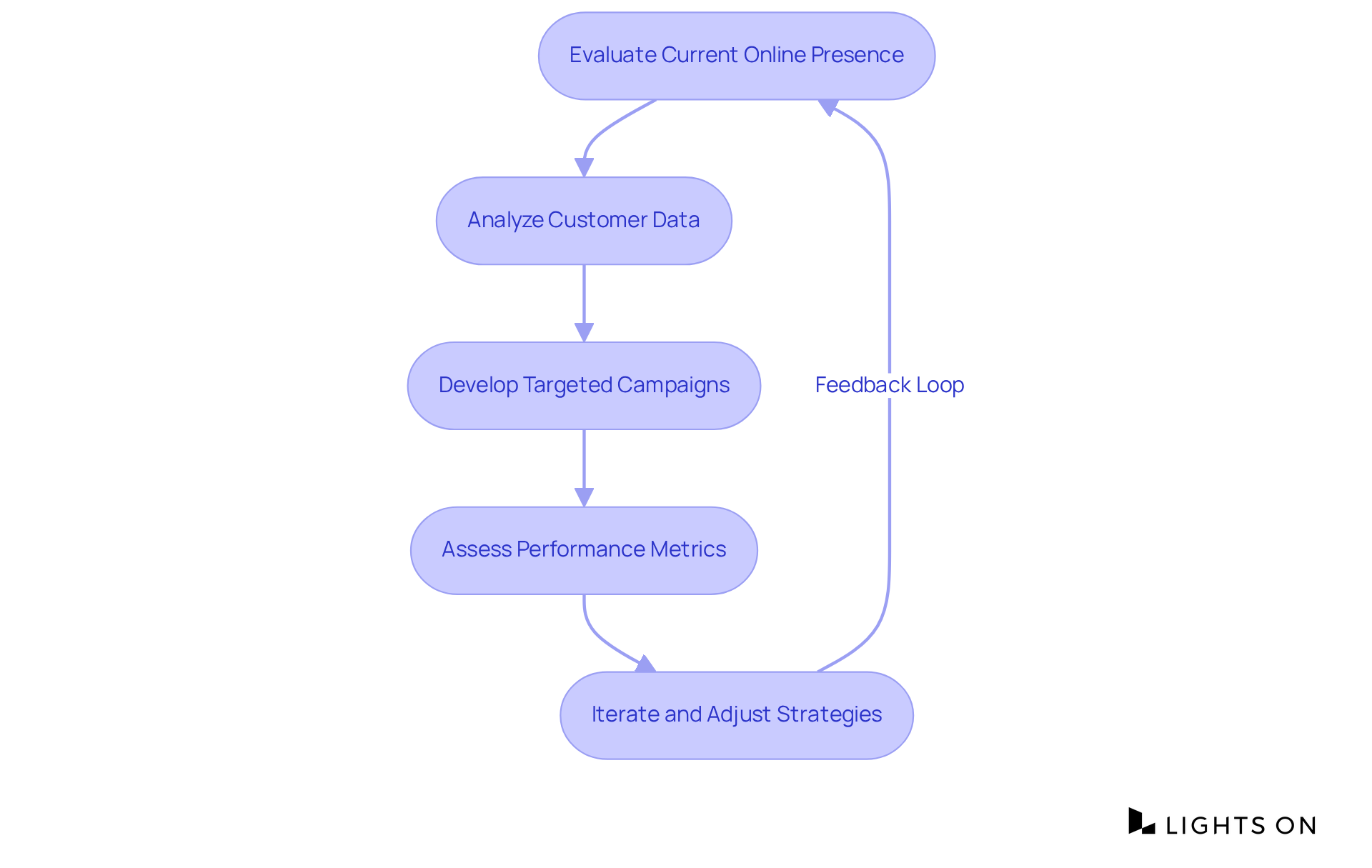
To establish a robust online presence, it is crucial to prioritize a user-friendly, mobile-optimized, and visually appealing website. Given that 81% of travelers consistently read reviews before making reservations, investing in effective SEO strategies is essential for enhancing search engine rankings. This ensures that potential visitors can easily discover your property.
Incorporating high-quality images and engaging content that highlight your unique offerings significantly enhances user experience. Furthermore, consistently refreshing your website with new content, such as blog posts or visitor testimonials, not only keeps users engaged but also signals to search engines that your site remains active and relevant.
In 2025, mobile optimization will be particularly vital; studies indicate that a well-optimized mobile site can lead to a substantial increase in bookings. Successful case studies illustrate that hotels adopting these strategies have experienced and visitor engagement, ultimately leading to increased occupancy rates.
As Bill Gates wisely noted, "Your most unhappy customers are your greatest source of learning," underscoring the importance of addressing client feedback through effective online reputation management.
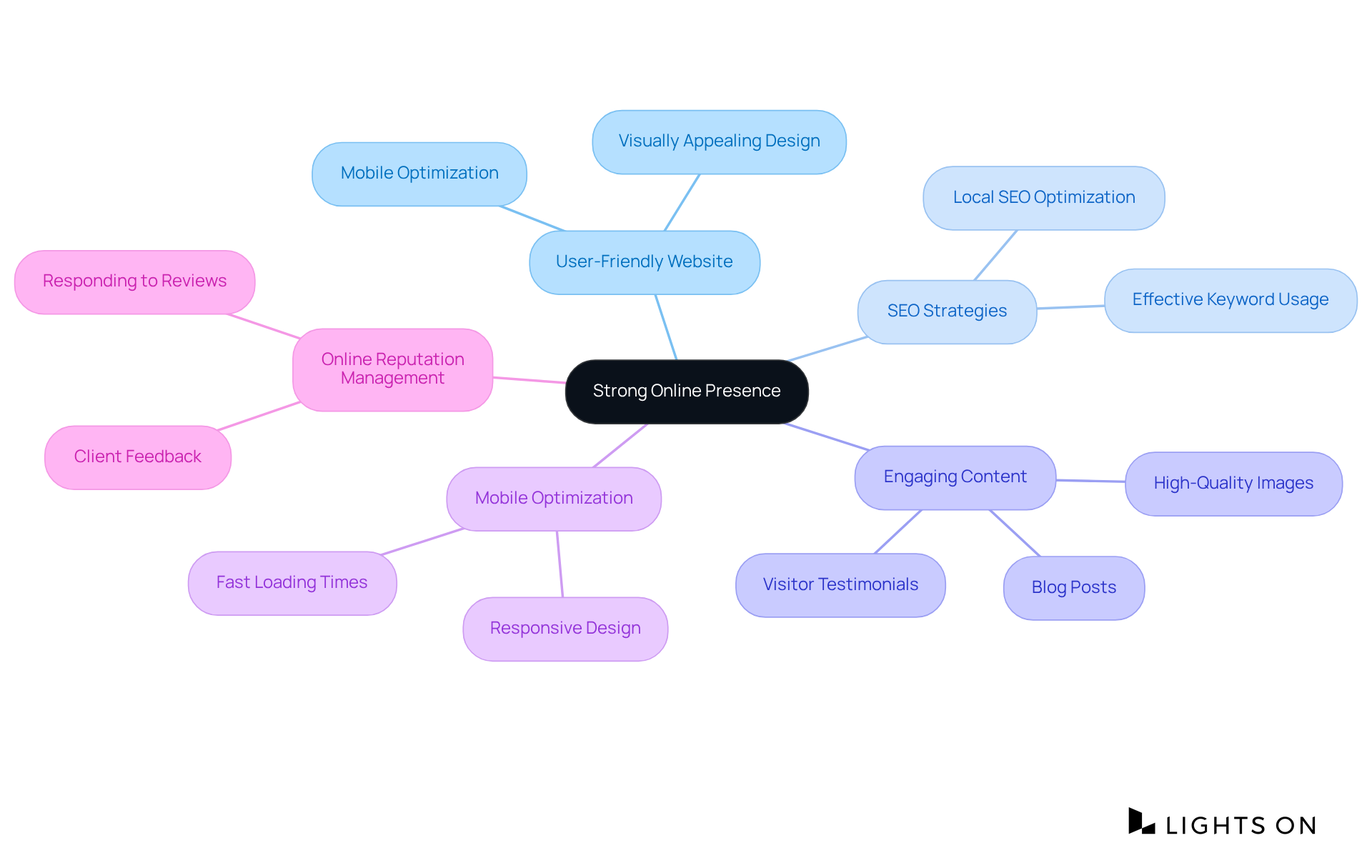
To effectively leverage social media, it is essential to create engaging content that resonates with your target audience. Start by collaborating with influencers who align with your brand values; this strategy not only broadens your reach but also enhances your credibility among their followers. Furthermore, utilize platforms such as Instagram and TikTok to showcase your property through visually appealing posts and stories, capturing the attention of potential guests. In addition, encourage user-generated content by developing unique hashtags and running contests. These initiatives can significantly , driving more interaction with your brand.
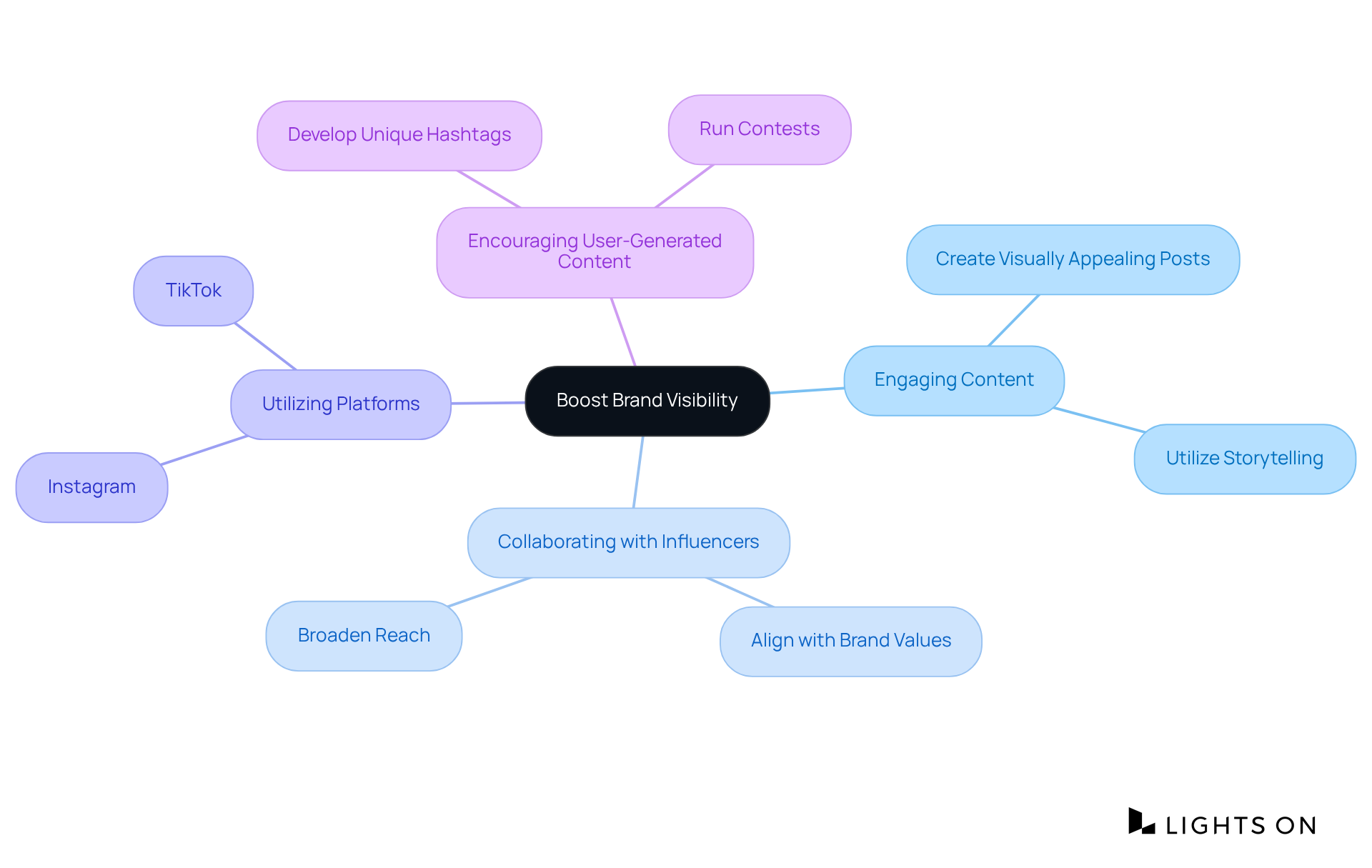
To maximize your on Online Travel Agencies (OTAs), it is essential to maintain accurate and up-to-date information regarding pricing, availability, and amenities based on hospitality marketing concepts. High-quality images and engaging descriptions are vital hospitality marketing concepts that play a crucial role in attracting prospective visitors, significantly enhancing the visual appeal of your listings.
Regularly monitoring your performance on OTAs allows you to adjust pricing strategies based on hospitality marketing concepts such as demand and competitor analysis, ensuring you remain competitive in the market. Furthermore, utilizing hospitality marketing concepts by encouraging satisfied guests to leave positive reviews can greatly influence future bookings; in fact, 72% of new customers will not book until they have read other traveler reviews, and 95% of traveler reviews are generally positive.
As Noya Shkolnik points out, 'Visitors are more inclined to select an establishment that utilizes hospitality marketing concepts to provide a network of experiences beyond its walls, resulting in higher bookings and revenue.' Additionally, consider highlighting any eco-friendly practices in your listings, as 70% of travelers would be more likely to book accommodation if it is eco-friendly.
By prioritizing hospitality marketing concepts, including eco-friendly initiatives, hotels can effectively leverage OTAs to boost their visibility and occupancy rates.
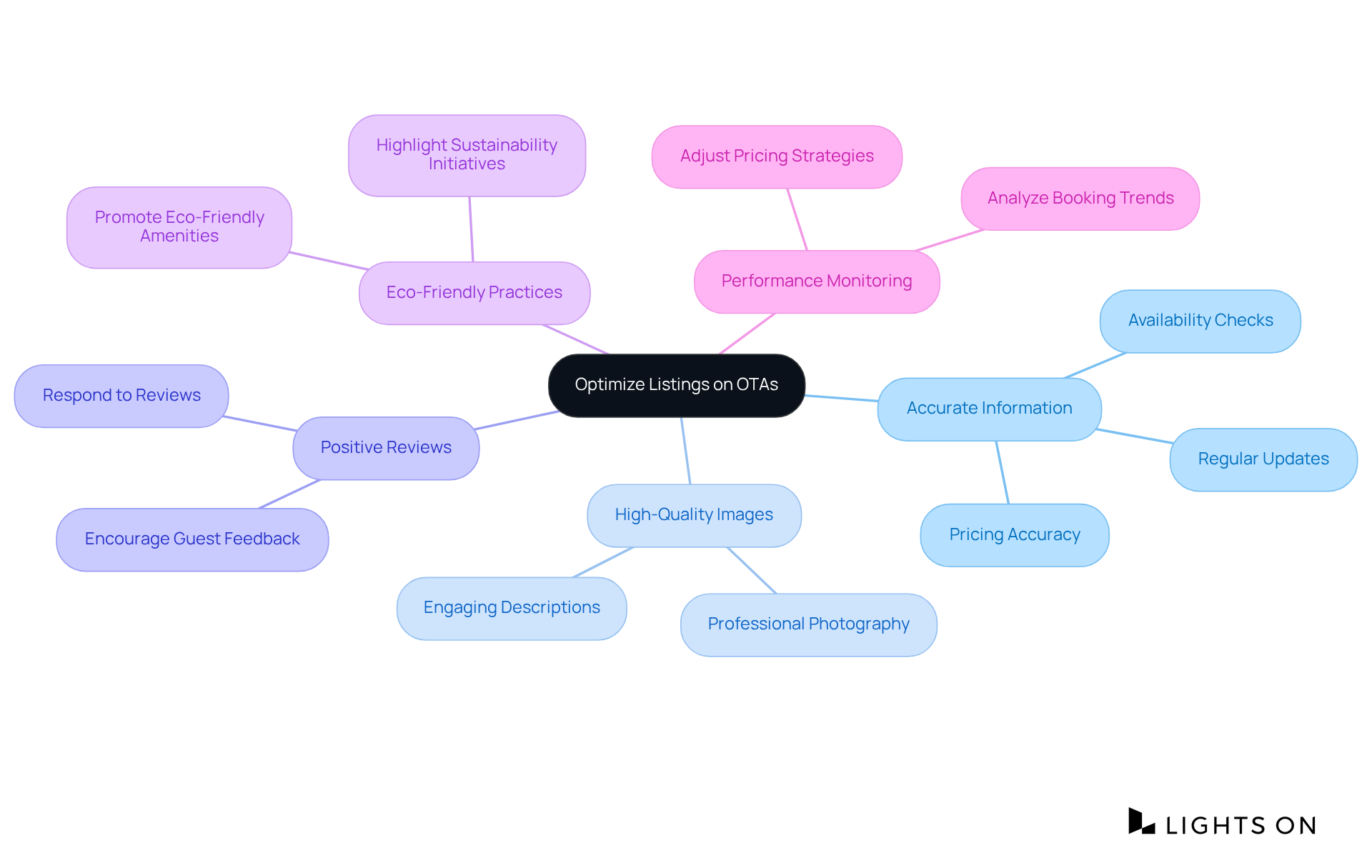
To create unforgettable visitor experiences, it is essential to prioritize tailored services that cater to individual preferences, in line with . Consider providing personalized welcome packages or customized itineraries that align with visitors' interests.
Furthermore, organizing special events or themed evenings that honor local culture can significantly enhance the visitor experience and attract a diverse clientele. Actively seeking input from visitors is crucial to refining and developing your offerings, ensuring that each stay is not only enjoyable but also distinctive.
This commitment to customization fosters loyalty, as visitors are more likely to return to establishments that make them feel valued and understood. As the hospitality landscape continues to evolve, utilizing hospitality marketing concepts by integrating personalized services will be vital for distinguishing yourself in a competitive market.
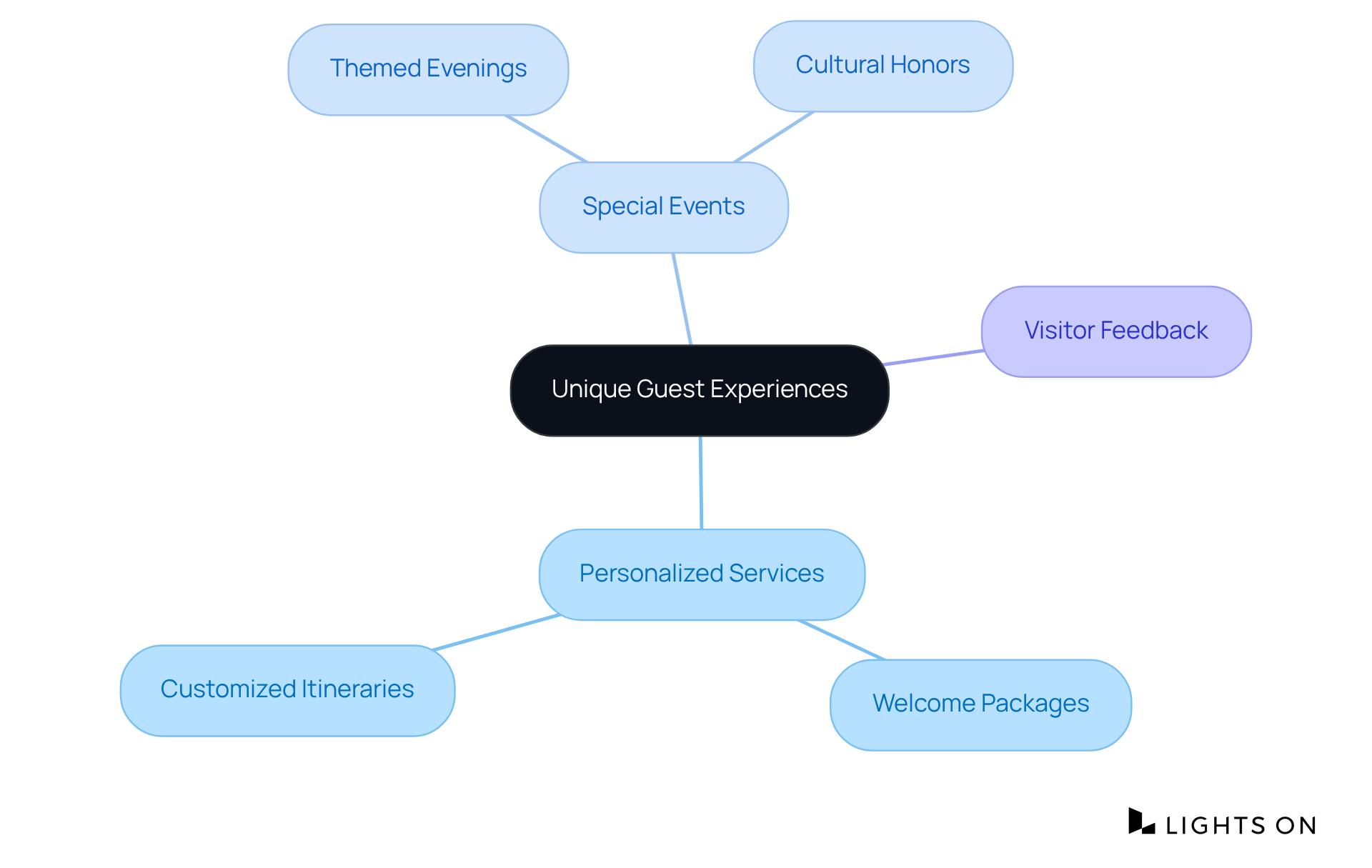
To enhance your establishment's visibility and attract more visitors, it is essential to invest in . Create informative and engaging blog posts, videos, and social media content that address common traveler questions and interests. Sharing local insights, travel tips, and behind-the-scenes stories can resonate deeply with your audience, fostering a connection that encourages bookings.
In 2025, statistics indicate that 75% of travelers consider social media a significant factor in their destination selections, underscoring the necessity for accommodations to engage effectively on these platforms. Furthermore, employing SEO techniques is crucial for optimizing your content, ensuring it ranks well in search engines and drives organic traffic to your website.
Successful hotel blogs highlight key hospitality marketing concepts, demonstrating that hotels that regularly update their blogs experience a 15% higher conversion rate compared to those that do not. By prioritizing content promotion, you can craft an engaging narrative that not only educates but also motivates prospective visitors to choose your property for their next getaway.
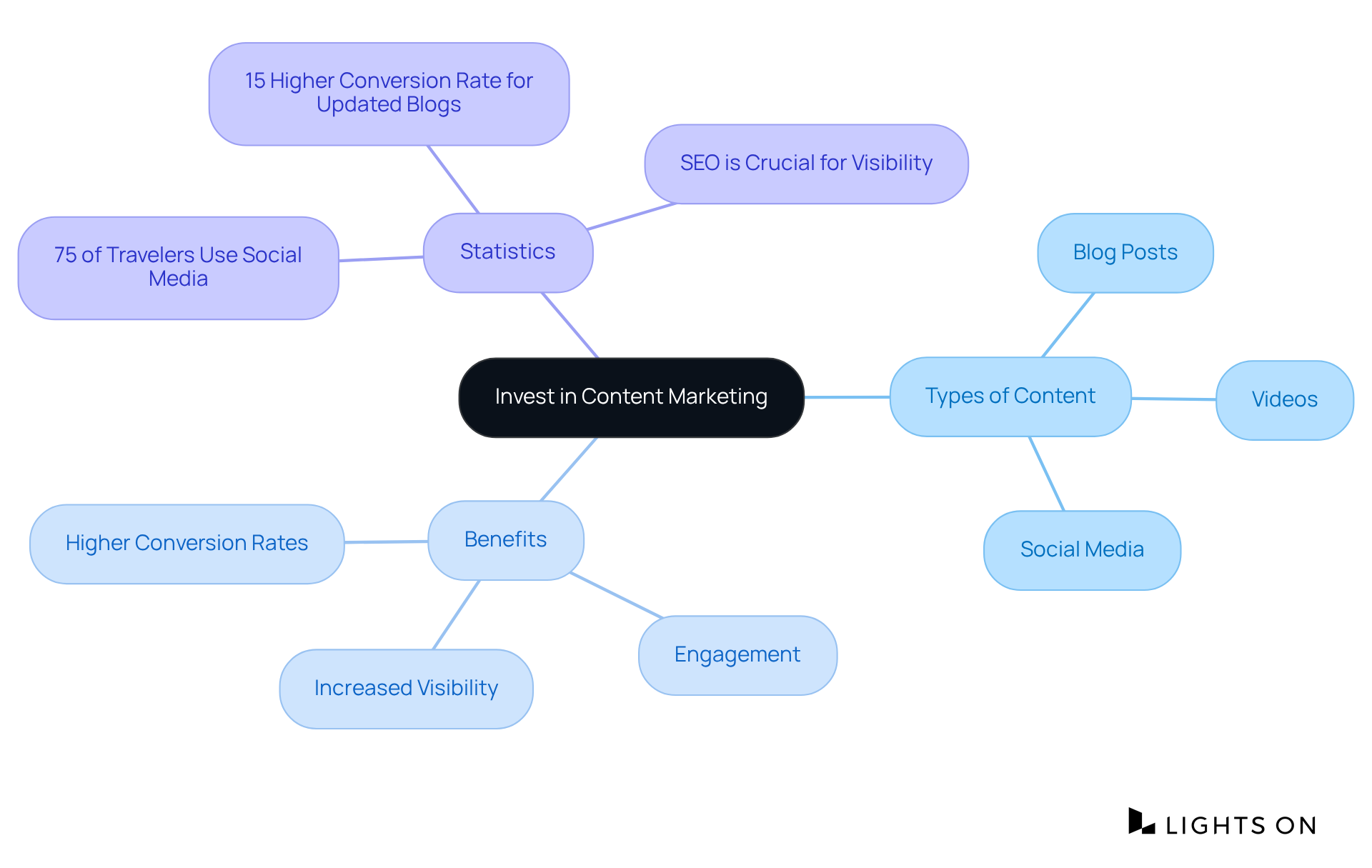
Leverage data analytics tools to meticulously track customer interactions, preferences, and booking patterns. This approach addresses the critical need for understanding visitor behavior in the context of hospitality marketing concepts. By examining this data, you can reveal trends that guide your promotional strategies, ensuring they align with visitor expectations.
Implement A/B testing to evaluate different campaign elements; this allows you to identify which approaches resonate most effectively with your audience. Statistics indicate that A/B testing can result in a 25% rise in conversion rates, underscoring its significance in enhancing promotional efforts.
Furthermore, frequently assess performance metrics to refine your strategies, maximizing your return on investment and elevating overall guest engagement. Notably, successful case studies demonstrate that companies employing A/B testing methods experience considerable enhancements in conversion rates, making it an essential practice for any hospitality marketing concepts promotional campaign.
To effectively execute these strategies, consider initiating on your website's booking page to discern which elements drive the most conversions.
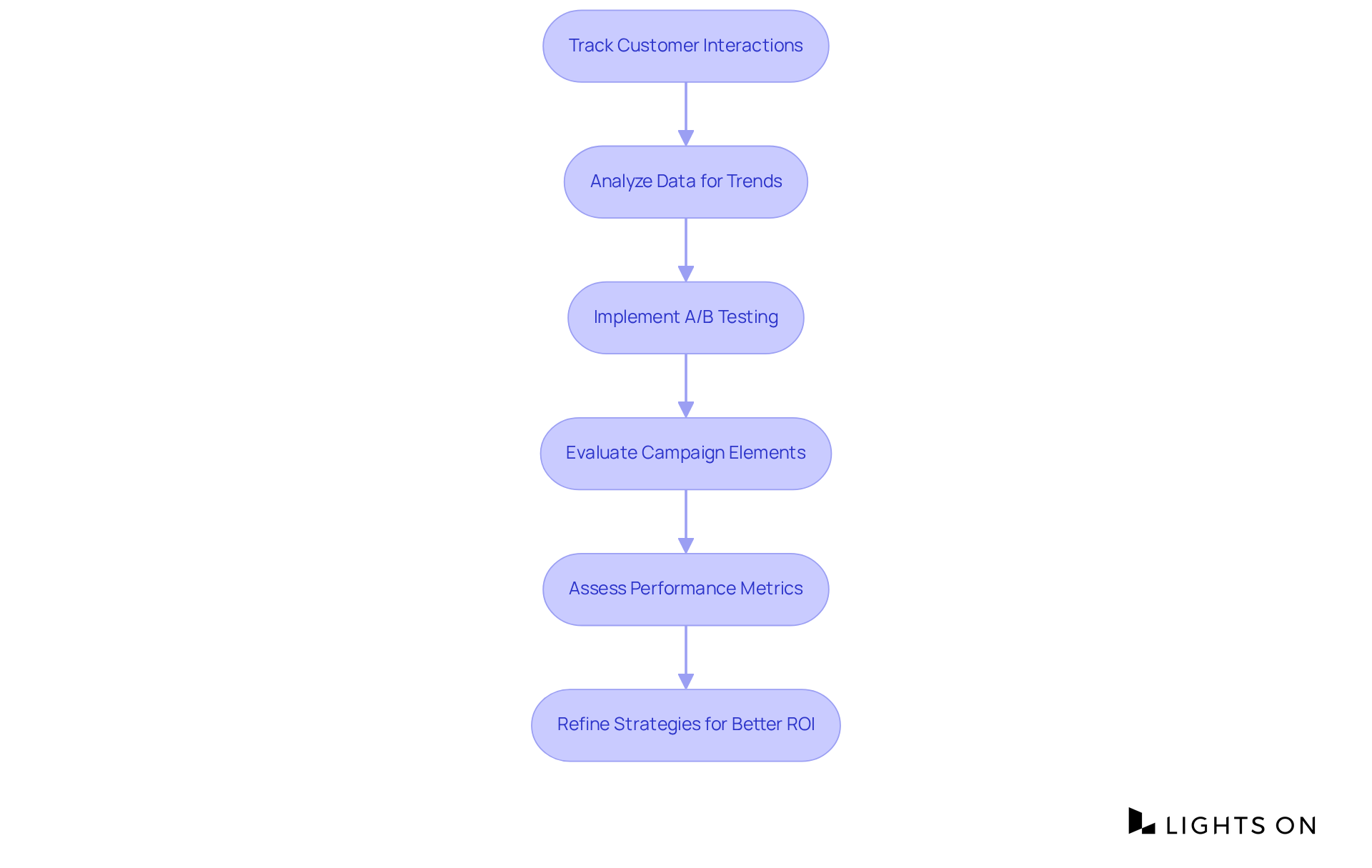
To effectively reach broader audiences, hospitality businesses must adopt offline promotional strategies that encompass:
By collaborating with local businesses, establishments can foster mutually beneficial relationships that enhance visibility and attract new guests. Notably, statistics reveal that are increasingly recognized as essential for hospitality marketing, with a significant number of businesses leveraging these connections to amplify their outreach in 2025.
Furthermore, attending trade shows and tourism fairs presents an excellent opportunity to showcase your property and network with potential clients. Distributing brochures and flyers in local businesses and tourist information centers can effectively capture the attention of visitors who may not be actively searching online. As Miguel McKelvey aptly noted, hospitality is about supporting multiple functions in one space, underscoring the importance of collaboration within the community.
In addition, effective community involvement strategies, such as:
can cultivate a sense of belonging and encourage return visits. By creating genuine local experiences, hospitality businesses can engage with visitors on a deeper level, ultimately enhancing their overall experience and satisfaction.
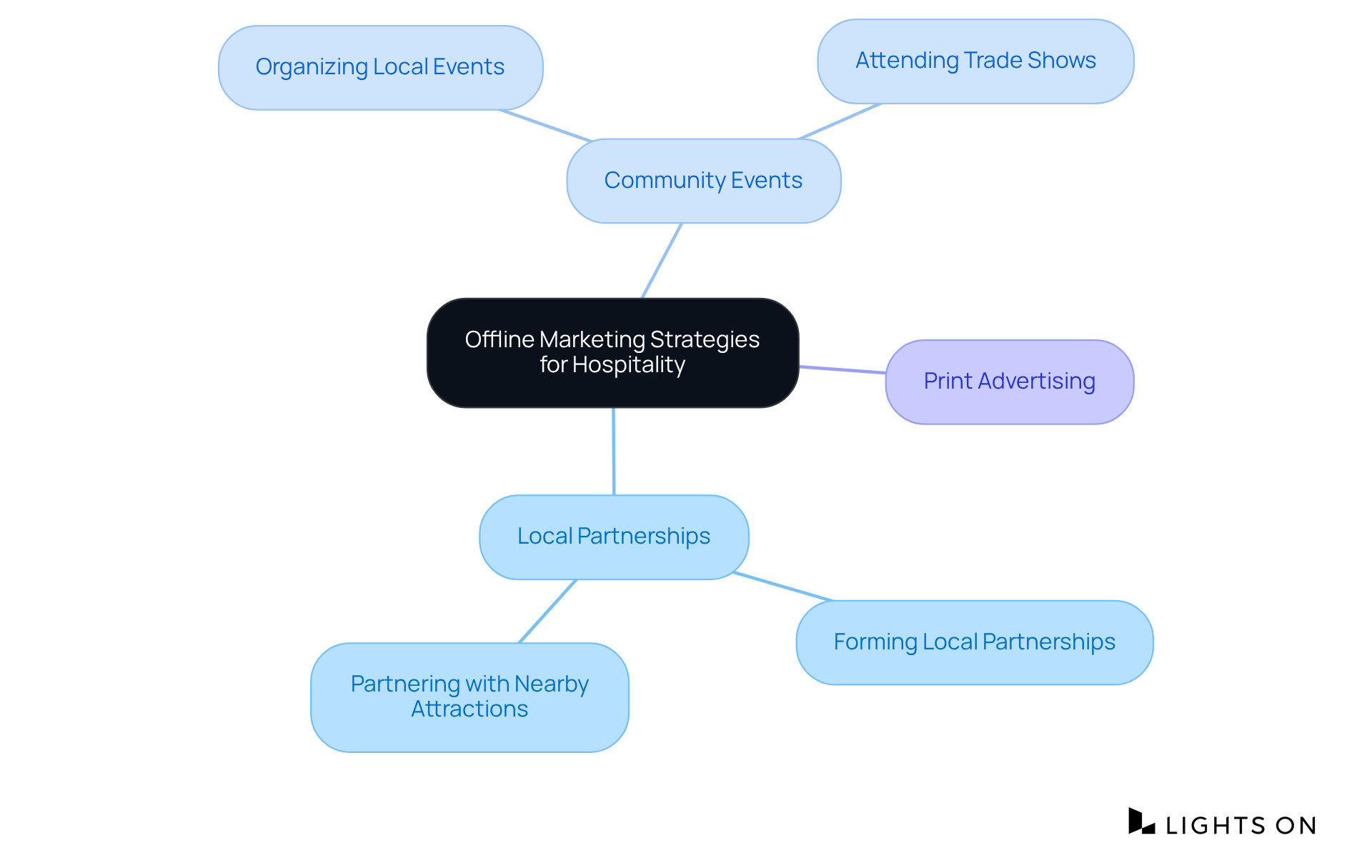
To navigate the competitive landscape effectively, conducting a comprehensive is essential. Start by identifying your primary competitors and evaluating their strengths and weaknesses. This involves examining the hospitality marketing concepts, including their promotional strategies, pricing structures, and customer feedback, to uncover market opportunities that your hotel can leverage. For instance, consider implementing a mystery shopper program to gain insights into the visitor experience at rival establishments. Furthermore, utilize online tools to monitor competitor pricing and promotional tactics, allowing you to adjust your offerings accordingly.
Leverage this information to refine your hospitality marketing concepts, ensuring your property stands out as a superior choice for prospective visitors. Successful case studies, such as the impact of personalized guest experiences through technology, illustrate how hospitality marketing concepts can enhance guest satisfaction and drive repeat bookings through tailored approaches. By focusing on distinctive selling points and addressing specific market demands, you can effectively position your establishment in a crowded marketplace.
As we look ahead to 2025, when the average daily rate (ADR) for U.S. hotels is projected to reach $162.16, understanding competitor pricing strategies will be crucial. Regularly updating your competitive analysis will enable you to benchmark performance accurately and identify areas for improvement. Remember, the essence of strategy lies in determining what not to do; thus, prioritize initiatives that align with your brand's strengths and market demands.
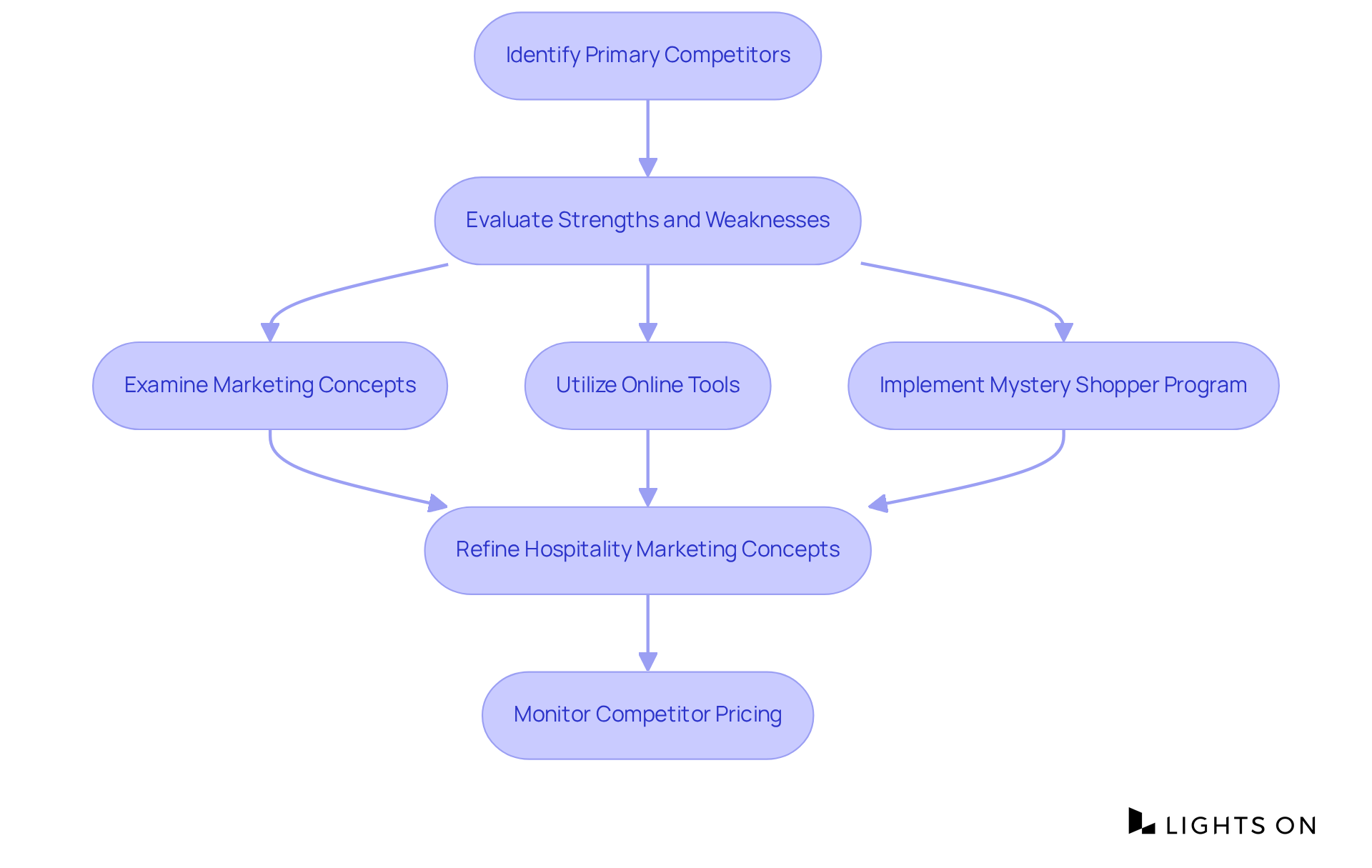
Embrace sustainability by implementing eco-friendly practices such as:
These initiatives not only attract environmentally conscious visitors but also position your establishment as a leader in hospitality marketing concepts focused on responsibility. Furthermore, promoting in your marketing materials can significantly enhance your brand image. Engage with your community through sustainability efforts, such as:
This engagement fosters loyalty among guests who value sustainability, ultimately strengthening your reputation in the market.
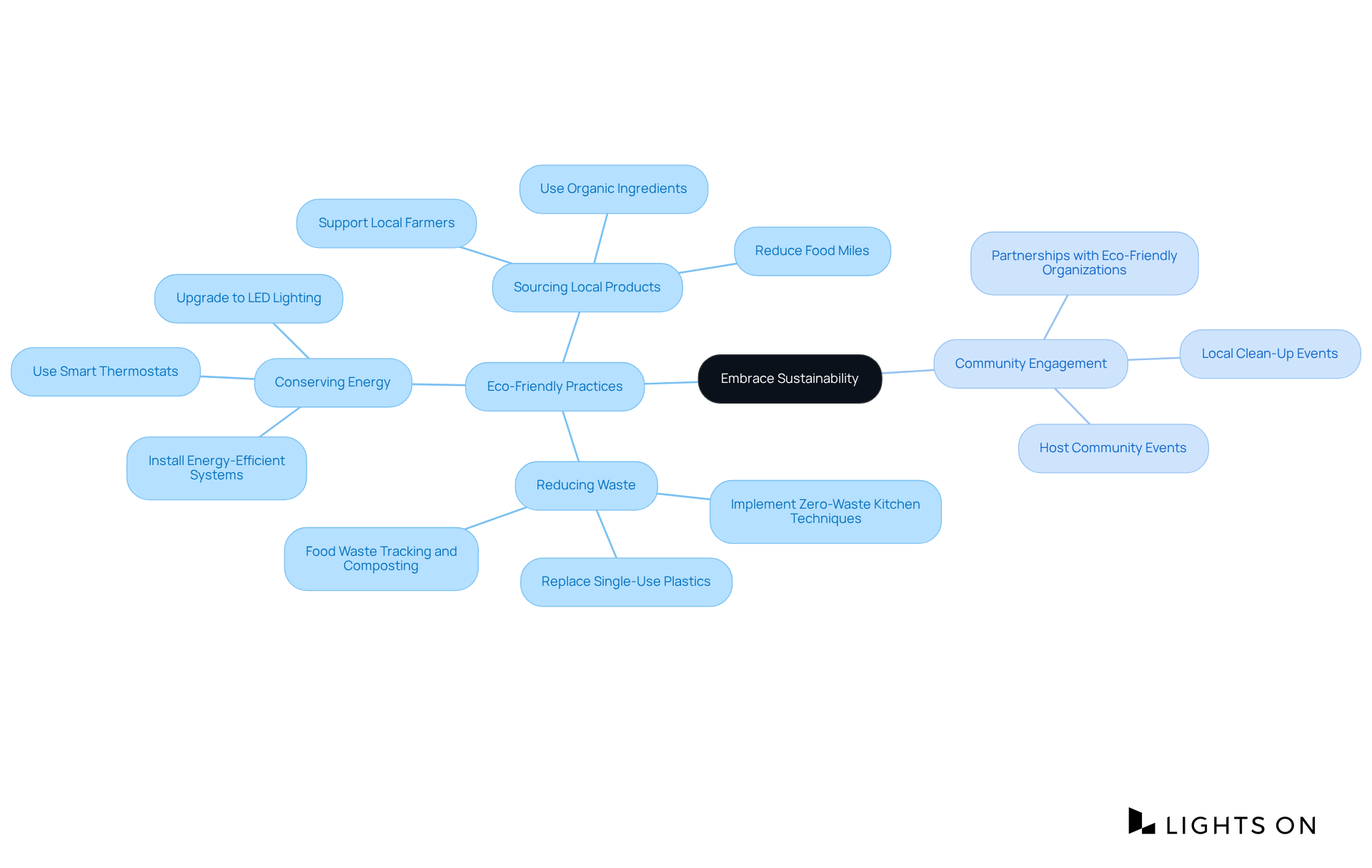
Transforming hospitality marketing strategies is essential for businesses striving to thrive in a competitive landscape. This article outlines key concepts that can significantly enhance visibility, attract guests, and ultimately boost bookings. By leveraging digital tools, optimizing online presence, and engaging with audiences through targeted marketing efforts, businesses can create memorable experiences that resonate with travelers.
Key insights highlight the necessity of a robust online presence, effective use of social media and influencers, and the strategic optimization of OTA listings. Furthermore, the emphasis on data analytics and offline marketing strategies underscores the importance of a comprehensive approach to hospitality marketing. By embracing sustainability and offering unique guest experiences, establishments can cultivate brand loyalty and distinguish themselves in the market.
In conclusion, hospitality businesses must adopt a multifaceted marketing strategy that not only focuses on immediate gains but also fosters long-term relationships with guests. By implementing these essential concepts, businesses can navigate the evolving landscape of hospitality marketing and position themselves for success in 2025 and beyond. The time to act is now; embracing these strategies will not only enhance visibility but also forge lasting connections with travelers seeking exceptional experiences.
How can I transform my digital marketing strategy for hospitality?
Begin by conducting a comprehensive evaluation of your current online presence to identify areas for enhancement. Utilize data analysis to gain insights into customer behavior and preferences, which will inform your promotional decisions. Develop targeted campaigns that highlight your unique selling propositions, and consistently assess performance metrics to adjust your strategies according to market trends and customer expectations.
What is essential for building a strong online presence in the hospitality industry?
Prioritize a user-friendly, mobile-optimized, and visually appealing website. Invest in effective SEO strategies to enhance search engine rankings, making it easier for potential visitors to discover your property. Incorporate high-quality images and engaging content, and regularly refresh your website with new content to keep users engaged and signal relevance to search engines.
Why is mobile optimization important for hospitality websites?
Mobile optimization is crucial as studies indicate that a well-optimized mobile site can lead to a substantial increase in bookings. By 2025, it will be particularly vital for attracting guests who primarily use mobile devices for their travel planning.
How can social media and influencers boost brand visibility in the hospitality sector?
Create engaging content that resonates with your target audience and collaborate with influencers who align with your brand values. Utilize platforms like Instagram and TikTok to showcase your property through visually appealing posts and stories. Encourage user-generated content by developing unique hashtags and running contests to amplify reach and engagement.
What role does online reputation management play in hospitality marketing?
Effective online reputation management is crucial as it addresses client feedback and helps improve customer satisfaction. As highlighted by Bill Gates, unhappy customers provide valuable insights that can lead to learning and improvement in service delivery.
Transform your group booking strategies with Lights On and watch your occupancy soar.